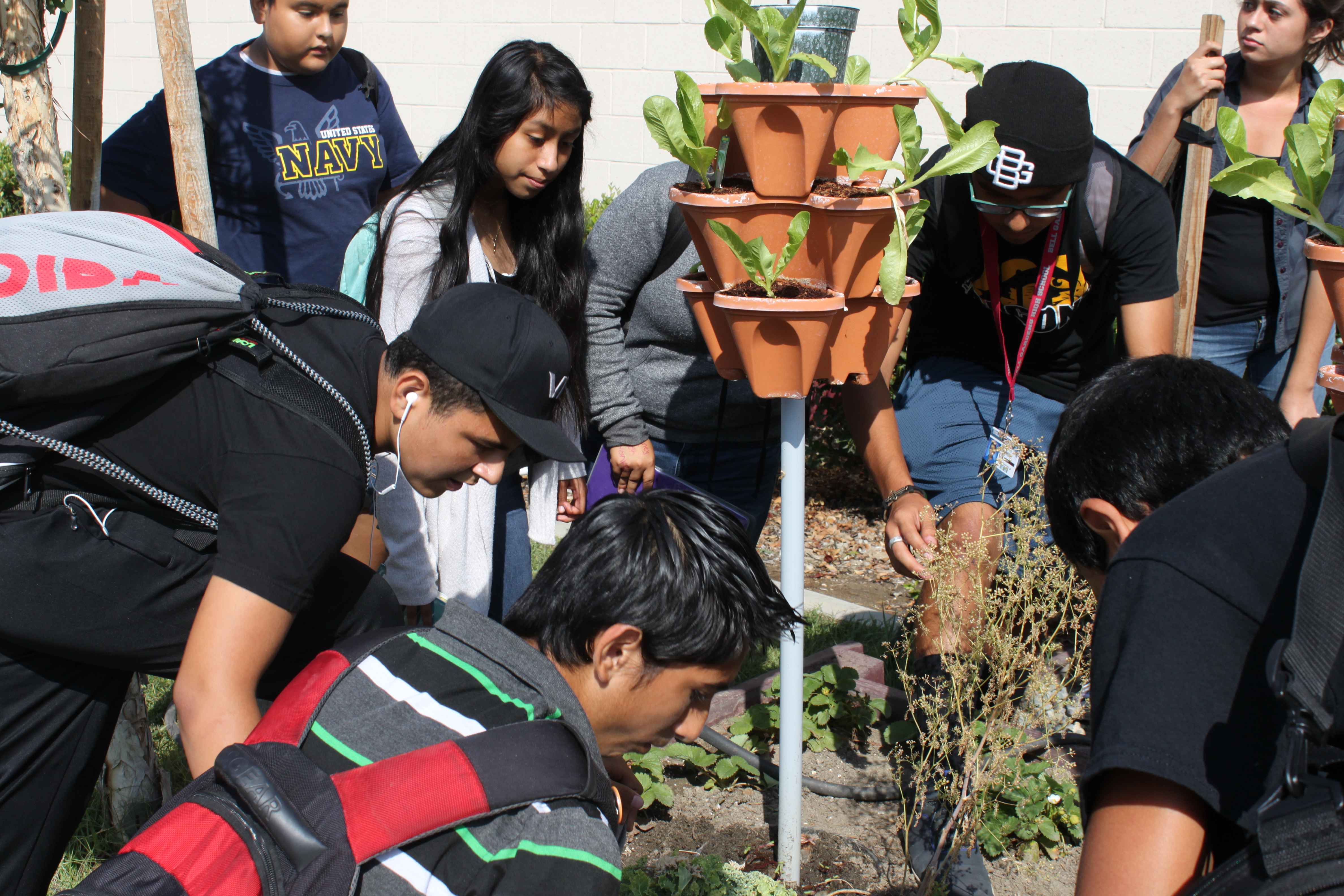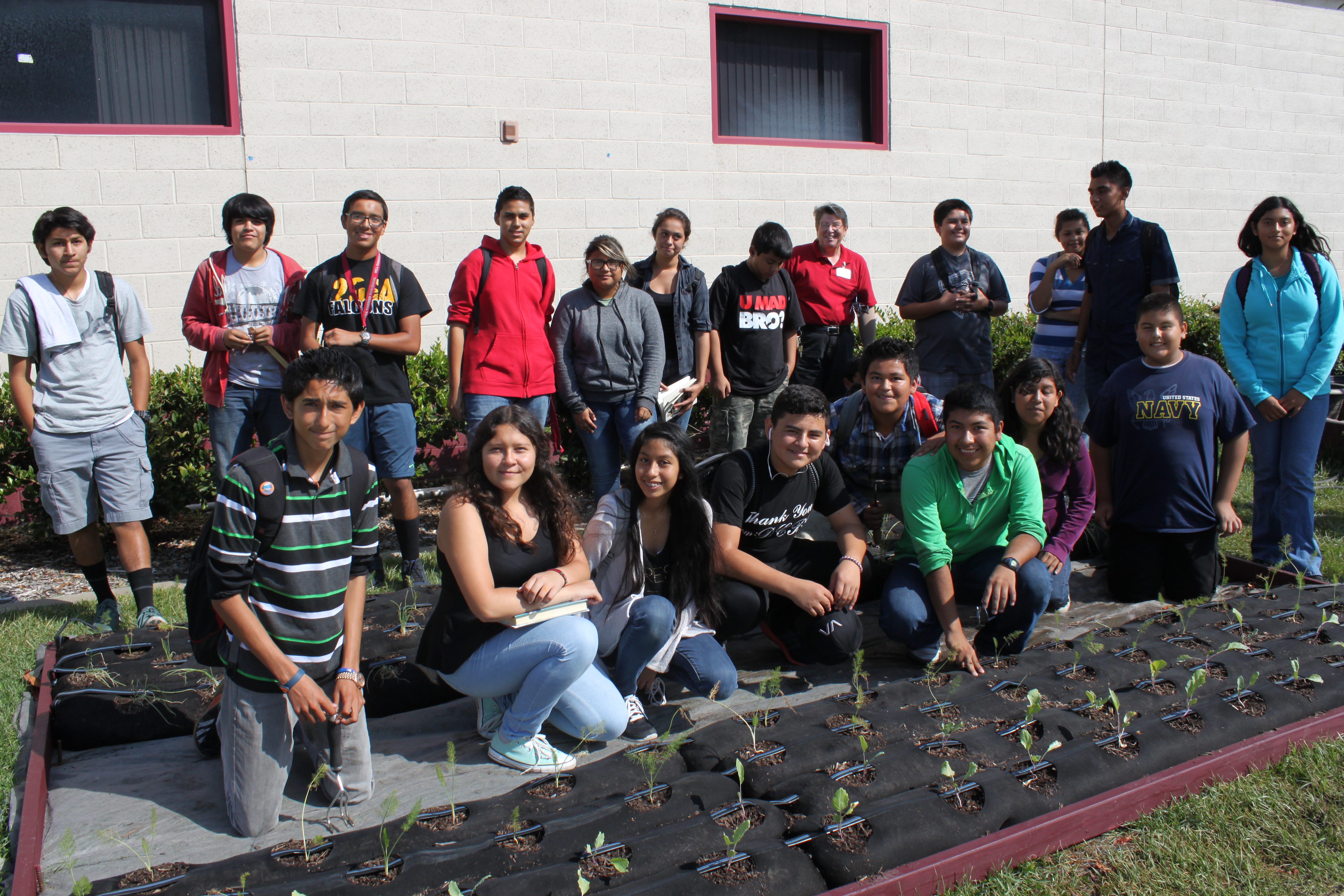Montebello Unified School District
Montebello Unified Students Build Unique Urban Farm
Bell Gardens High pathway students create vertical hydroponic farm while preparing for college
BELL GARDENS, Calif. – Students of the Globally Responsible Environmental Education Network (GREEN) Pathway at Bell Gardens High School in Montebello Unified School District are not only preparing for college and the 21st century global marketplace, they are also building urban farms, raising community awareness around good stewardship of the earth and learning about emerging environmental technologies.
“The GREEN pathway seeks to provide our students high-quality academics coupled with rich, hands-on experience in order to prepare them for careers in the fields of environmental and renewable technologies of today and tomorrow,” said Montebello Unified Board of Education President David Vela. “These students are truly learning about what will make the world a better place, while preparing for success academically and professionally.”
Over the past two years, GREEN students have participated in a unique curriculum of research and development under the guidance of GREEN Pathway Lead and Coordinated Science teacher Jan Barber-Doyle. Last year, students built an organic, soil-based grow bed as well as vertical hydroponic towers using coir fiber, to compare the yield between the two methods.
Students are also learning about microorganism communities in soil, pH balancing of water sources and nutrients, as well as irrigation methods. This year, they’ve also added Gardensoxx planters to the mix, a technology patented by industry partner Filtrexx International LLC. Students fill the GardenSoxx, 8” UV resistant polypropylene mesh tubes, with specially blended composted soil, herbs and plants, and an irrigation tape.
The vertical hydroponic garden, the only one of its kind on a Southern California high school campus, uses sustainable coconut fiber instead of soil because it is naturally free of bacteria and pathogens, plant diseases, weeds, and possesses unique aerating and hydrating properties. The idea of this type of garden is not mass-production, but to facilitate urban farming in local communities that don’t have the space or soil required for traditional gardening, while increasing access to fresh, high-nutrient vegetables and fruits.
“Space is key to growing enough produce for a family and growing up is one solution,” said Barber-Doyle, who has been teaching for 16 years. “By and through hands-on experience, students are understanding how and why it’s important to take what they are learning out into their own community and beyond.”
In the ninth and 10th grades, students in the GREEN Pathway learn about diminishing nutrients worldwide, the need for high-yield sustainable produce and renewing the collective relationship with the natural world in a mix of art, botany and agro-ecology. In 11th grade, GREEN students enroll in environmental science and focus on renewable energy, power usage and connect prior semesters’ instruction with the state of emerging energies and technologies.
Students also link with community partners, like Alegria Farms – the company that joined the students to assist with building the vertical hydroponic garden and GardenSoxx grow bed – to learn from experts. They also have taken several field trips to Alegria in Irvine to learn more about the benefits of fresh produce and careers in urban micro-farming. Students are also scheduled to meet with representatives of Filtrexx, the sustainable growing system that can be laid over concrete.
“This project exemplifies our goal of supplementing traditional classroom teaching and learning of science with practical, active learning that facilitates long-term comprehension and results,” said Superintendent of Education Susanna Contreras Smith. “We are so proud of our students, and their facilitators and instructors, for making this pathway a true model and example of the future.”
The core components of GREEN, like other pathways at MUSD, are intended to prepare students for success in post-secondary programs, deliver concrete knowledge and skills through technical courses, offer opportunities to learn through real-world experiences and community partnerships, and to provide support services for student success.


Montebello Unified Students Build Unique Urban Farm
Montebello Unified School District
- Image Title
- BGHS GREEN2
- Image Caption
- Bell Garden High School's GREEN Pathway ninth-grade students tend to their traditional soil-based garden, ensuring soil and plants are healthy while a vertical hydroponic garden stands in the middle, filled with green romaine lettuce in recycled coir fiber.
Right-click on the image to save
- Image Title
- BGHS GREEN 1
- Image Caption
- Bell Garden High School's GREEN Pathway ninth-grade students pose near the GardenSoxx planters -- UV resistant polypropylene mesh tube filled with specially blended composted soil, herbs and plants, and an irrigation tape -- they helped build.
Right-click on the image to save


